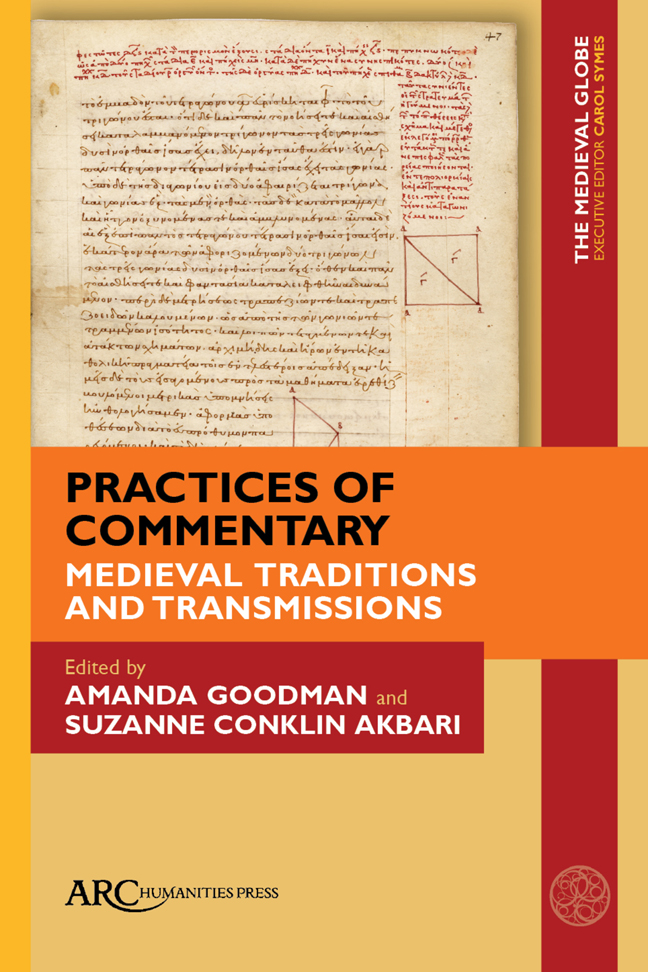Book contents
- Frontmatter
- Contents
- List of Illustrations
- Introduction: Commentary at the Crossroads
- Graeco-Roman Commentary Beyond Alexandria: Problems and Prospects
- From Plane to Space: The Narrative Arc of a Byzantine Mathematical Manual
- Periodization in the Sunni Qur'an Commentary Tradition: A Chronological History of a Genre
- On the Practice of Autocommentary in Sanskrit Sources
- Oral Commentaries and Scholarly Debates in Sanskrit Philosophy
- On the Nature of Chinese Buddhist Scriptural Exegesis: Observations on the Commentaries of Chengguan, Woncheuk, and Other Sui-Tang Exegetes
- The Mise-En-Page of a Sino-Tibetan Dunhuang Manuscript: Yuanhui's Commentary on the Laṅkāvatārasūtra
- Commentary and Multilingualism in the Ottoman Reception of Texts: Three Perspectives
- Index
Oral Commentaries and Scholarly Debates in Sanskrit Philosophy
Published online by Cambridge University Press: 17 February 2024
- Frontmatter
- Contents
- List of Illustrations
- Introduction: Commentary at the Crossroads
- Graeco-Roman Commentary Beyond Alexandria: Problems and Prospects
- From Plane to Space: The Narrative Arc of a Byzantine Mathematical Manual
- Periodization in the Sunni Qur'an Commentary Tradition: A Chronological History of a Genre
- On the Practice of Autocommentary in Sanskrit Sources
- Oral Commentaries and Scholarly Debates in Sanskrit Philosophy
- On the Nature of Chinese Buddhist Scriptural Exegesis: Observations on the Commentaries of Chengguan, Woncheuk, and Other Sui-Tang Exegetes
- The Mise-En-Page of a Sino-Tibetan Dunhuang Manuscript: Yuanhui's Commentary on the Laṅkāvatārasūtra
- Commentary and Multilingualism in the Ottoman Reception of Texts: Three Perspectives
- Index
Summary
OVER THE FALL and winter of 2020–2021, students and faculty at the University of Toronto and the Manipal Academy of Higher Education in India came together to study with two renowned scholars of classical Sanskrit knowledge systems: Shree Vidyashreesha Tirtha (formerly Dr. D. Prahladacharya) and Dr. Mani Dravid Shastrigal. As in many traditional learning contexts, these pandits used oral commentary in Sanskrit to guide students through philosophical texts. Unlike in most traditional learn-ing contexts, however, this oral commentary was conducted entirely online via the Zoom conferencing platform. This paper highlights the continuities and disjunctures of this digital commentarial experience within the larger genre of Sanskrit philosophical com-mentaries and explores the relationship between written commentary and orality in this new media landscape.
The pandits taught sections of two influential works of philosophy and metaphys-ics: the Nyāyāmṛta (Ambrosia of Logic) by Vyāsatīrtha (fifteenth/sixteenth century) and a polemical rejoinder known as the Advaitasiddhi (The Success of Non-Dualism) writ-ten by Madhusūdana Sarasvatī (sixteenth century). In addition to being highly intertex-tual—incorporating excerpts and citations from a millennium of writings—these texts are highly technical and require expertise in several Sanskrit knowledge systems, mak-ing the oral exegesis of an expert all the more necessary for their study. The first part of this paper, attributed to Elisa Freschi, introduces Sanskrit philosophical commentaries in a broad sense. By showing how philosophical commentaries function through net-works of inter-texts, Freschi explains how commentary was the de facto way of doing philosophy for Sanskrit intellectuals. The next section, attributed to Jonathan Peter-son, contextualizes Vyāsatīrtha and Madhusūdana Sarasvatī within two influential (but mutually antagonistic) traditions of scriptural hermeneutics known as Vedānta. The third section, attributed to Ajay Rao, uses the sessions with Vidyashreesha to examine the relationship between textuality and orality in the context of Vedānta commentary.
Commentaries as Networks
What makes a text a “commentary”? The question, as Isabelle Ratié shows in this issue, requires a complicated answer. There is no single word for “commentary” in Sanskrit. Rather, there are several, each of which conveys different qualities and degrees of textual engagement. The bhāṣya, for instance, usually entails an extensive elaboration on a con-cise (often cryptic) root text: the Mahābhāṣya of Patañjali is but one of many examples. A vārttika, on the other hand, often indicates a concise, laconic commentary—Kātyāyana's Vārttika on Pṇini's Aṣṭdhyāyī, for instance.
- Type
- Chapter
- Information
- Practices of CommentaryMedieval Traditions and Transmissions, pp. 91 - 106Publisher: Amsterdam University PressPrint publication year: 2023

